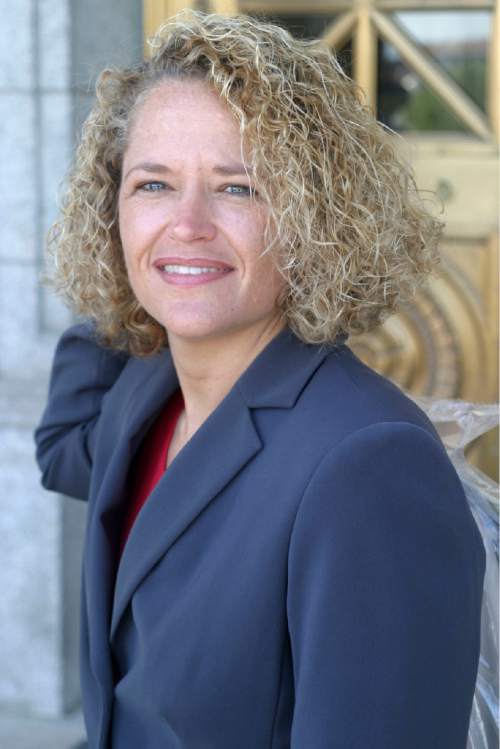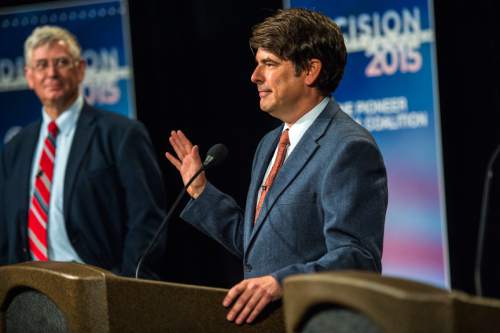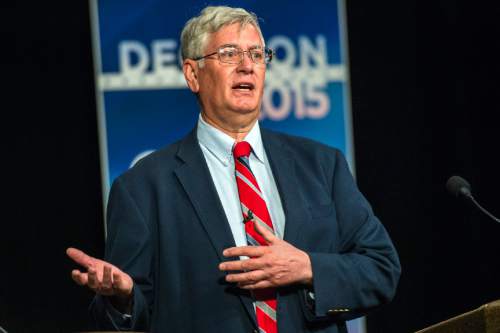This is an archived article that was published on sltrib.com in 2015, and information in the article may be outdated. It is provided only for personal research purposes and may not be reprinted.
When it comes to cash, Mayor Ralph Becker's campaign fund continues to be where most of the bucks stop.
The final campaign disclosure before Tuesday's primary shows that from July 1 to Aug. 4, Becker raised $82,764. That brings his campaign earnings this year to $502,259. On top of that, he had about $200,000 in his fund from a previous campaign.
Becker has spent $323,441 in his quest for a third term. He has $379,151 remaining — a clear financial edge that he would take into the general-election campaign if he emerges from the primary.
Becker has outspent all four of his challengers combined.
The top two vote-getters in next week's election will face off Nov. 3.
Jackie Biskupski, a former state legislator who now is an administrator for Salt Lake County Sheriff Jim Winder, has raised $209,510, according to her disclosure filed with the city recorder's office.
Since July 1, she has brought in $66,295 — some $16,000 less than Becker during the past five weeks.
Biskupski has spent $204,850 and has $85,660 left in her campaign fund. If she emerges from the primary, she would have about $294,000 less than Becker.
City Council Chairman Luke Garrott has raised $34,664 and has $669.54 remaining in his mayoral campaign fund.
Another challenger, businessman Dave Robinson, reported $22,311 in his campaign fund. He has $9,300 left.
Community activist George Chapman has raised $11,711 and has $655 remaining.
Reagan Outdoor Advertising reported making "in-kind" contributions of billboards in conjunction with the campaigns of Becker's challengers. It gave Biskupski $7,475 in such donations; Chapman got $7,311 and Garrott $7,425 in such services. There was no listing for Robinson.
Utahns for Independent Government, a political action committee connected to Reagan, also has put up billboards for Biskupski, Garrott and Chapman. The PAC did not report dollar amounts for those activities, according to City Recorder Cindi Mansell, but did transmit a message to her office saying it had made independent expenditures.
When it comes to the incumbent's bulging campaign fund, the question is whether aggressive spending can overcome Becker's low poll numbers, according to Tim Chambless, a University of Utah professor of political science, who also is affiliated with the Hinckley Institute of Politics.
Although a recent poll commissioned by The Salt Lake Tribune gave Biskupski a 33 percent to 21 percent lead over Becker, 26 percent remained undecided. Garrott, Robinson and Chapman were all in single digits.
Beyond that, Chambless said intangibles are at play, such as the flap surrounding police Chief Chris Burbank's forced resignation in June and a more recent dust-up regarding Becker's spokesman Art Raymond last week. Raymond was placed on administrative leave and is the subject of a City Hall investigation into his use of a city computer for sporadic political commentary on Tribune comment boards.
"How will that translate, how will those things play in the election? That's hard to quantify," Chambless said. "It comes down to how people feel. Do they feel two terms is enough? Is it time for change?"
If Becker and Biskupski come out of the primary, the mayor will have a clear advantage on the money front, Chambless said.
The money can be spent on mailings, as well as door-to-door and telephone campaigning. For voters not tuned in to politics during spring and summer, Becker could realize a boost, particularly among undecided voters.
Becker also has the advantage of incumbency. For example, the mayor will join Interior Secretary Sally Jewell at a media event Thursday to announce a new program aimed at children and the outdoors. And he was singled out for praise by presidential hopeful Hillary Clinton on Wednesday at a fundraiser in Park City. It's the kind of publicity you can't buy.
By contrast, if successful in the primary, Biskupski should be able to attract money that has been out of reach so far, Chambless said. She also should pick up most of the voters who cast ballots for unsuccessful challengers.
Beyond that, Chambless said Biskupski may have built-in constituencies among women and the LGBT community.
But other intangibles come into play, he explained, such as likability, as well as a candidate's ability to bring passion to a campaign.
Leading up to the primary, four challengers have ganged up on the mayor, Chambless said. But after the primary, it will be one on one. The race will be won by the candidate who can most inspire voters.







